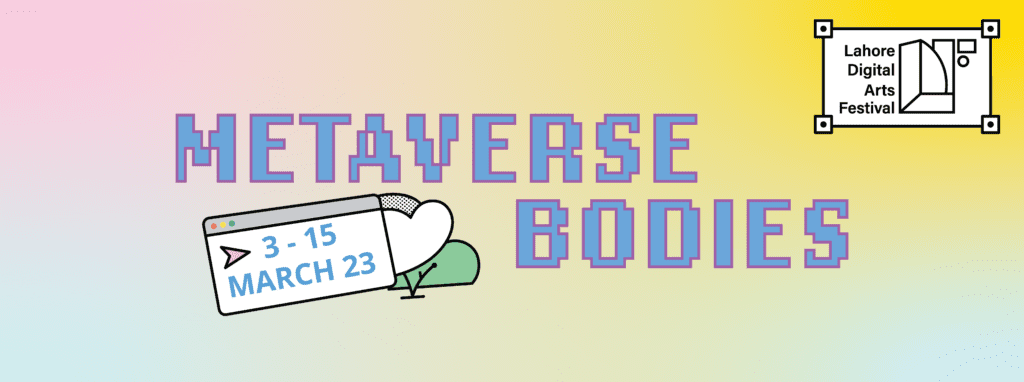METAVERSE BODIES / 3-15 March 2023

What is our embodied experience of reality?
The further we move into the digital age, the more we seek to immerse ourselves. From the static experience of reading a webpage to now tricking our minds with augmented reality, we are full of science fiction visions of fully customizable simulated realities in which we live out our dreams and fantasies. The COVID-19 pandemic provided the necessity to investigate more practical virtual realities for work and socializing, while the success of NFT avatars and virtual real estate provided a financial interest for companies working in the field. Many companies, including Meta/Facebook, announced plans for the development of their own metaverses; fully-formed digital universes in which people live, work, and interact, entirely from their own spaces.
The technology required for a fully functional metaverse has not been developed yet, but it already presents fascinating questions of existence, identity, and reality – not the least of which is how we as embodied beings will integrate into a world that mostly only requires our minds. This gives rise to questions such as:
- What will it mean to embody the metaverse?
- How might our further immersion into virtual realities affect our physical selves, and how might our physical reality shift or respond to more virtual environments?
- Will this development prompt further integrations between physical and virtual realities, or will they exist as parallel worlds?
- How do we as embodied beings with physical needs and awareness adjust to a non-physical existence? What is a healthy balance of physical and digital interaction?
- How will some of the issues of embodied prejudice such as racism or body shaming manifest or evolve in the metaverse?
- Where do we draw a boundary between a physical and a digital presence?
- Should we embrace the metaverse or not?
There are multiple implications for the contradictions and opportunities that occur at the meeting point of metaverse bodies. For example, the ability to change our bodies through customizable avatars leads to many new questions. This particular feature could create more inclusive spaces wherein people from minority groups can ‘blend in’ or even offer people with disabilities the opportunity to interact in society in a way they are unable to or barred from in physical reality. But on the same token, it might further entrench hierarchies and majority rule, increasing cyberbullying and ableism.
This concept also calls into question how our physical bodies will be shaped by digital reality, and vice versa. It touches on notions of isolation and the lack of physical touch that many experienced during the COVID-19 pandemic, and postulates if digital interaction can ever be as meaningful as physical interaction, even in an immersive virtual environment. It leads to interesting notions of materiality and how digital creations might manifest in physical reality, and what infrastructure might be created in order to support a more digital existence.
For our second bi-annual edition of Lahore Digital Arts Festival in 2023, we invite artists to explore this idea of “Metaverse Bodies.” From the creation of avatars and its implications on minority/majority power dynamics, to isolation and the loss of physical touch and interaction, we are curating an array of cutting-edge digital works that look at the embodied experience of the metaverse from new and interesting perspectives. We especially encourage artists to consider the theme in the context of four subthemes, climate change, gender, privacy, and heritage.
Artists might consider the legal, ethical, commercial, philosophical, and existential implications of the metaverse, as well as the aesthetics and opportunities provided by an immersive digital reality. All digital mediums are acceptable. Submissions that offer innovative and complex ideas are preferred. Lahore Digital Arts Festival aims to curate high quality, provocative art for display in a digital medium in keeping with the theme and this new reality. We hope to educate and inspire Pakistani audiences to think of art and art exhibitions/festivals in a new way as well as put Pakistan on the map of digital arts festivals.